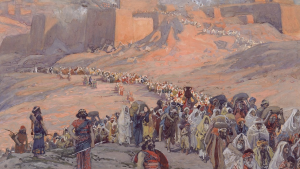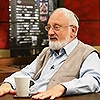Audio Version Of The Blog – 8/31/22
Listen to an Audio Version of the Blog
Download:MP3 Audio

Listen to an Audio Version of the Blog
Download:MP3 Audio
My new article on Linkedin “Why We Do Not Remember the Moment of Birth”

Humans are emotional beings. Feelings guide us, determine our thoughts, our decisions in life, and our judgment. Whatever we do, we do it to feel good or to avoid feeling bad. Feelings are so central to our being that they even determine our memory. Why then do we not remember the most critical moment of our lives, the moment of birth? In fact, we also do not remember our formative years, when we are one or two years old. The reason is that in the first years of life, our physical senses quickly develop but our emotional world, our “self,” lags behind, and before we have a distinct “self” with its own emotions, we do not attach emotions to events, and therefore do not remember them, at least not more than as mere pictures.
Even later in life, at age three or four, from which many of us do have memories, they are still vague and incomplete, as though they are “immature” or “primitive” forms of memory.
“Real” memories begin when we begin to develop a psyche, a self that recognizes itself as an individual being. Once we perceive ourselves as separate beings, with our own thoughts and feelings, and we communicate with others as distinct individuals communicating with other distinct individuals, we transition from being little animals with the potential to become human beings into actual people.
The transition reflects itself in the way children connect with others, and becomes fully developed once we begin to develop hormonal attraction, in early adolescence.
This development, which is uniquely human, points to the reason for the creation of human beings. We are not meant to remain like animals; we are meant to ask about our world, about the reason for its existence, and for our existence in it. We are meant to ask about and understand the purpose of our lives beyond the physical level. Only once our emotions are fully developed can we begin to explore such questions seriously.
For me, that moment came with the question “What’s next?” I would ask myself, “What’s next, school, university, and…?” I did not have an answer. Because of it, I did not want to learn; I became apathetic. It was an awful feeling, a feeling of futility, of being forced to do something meaningless.
Not everyone is tormented by this question. Some people go through life chasing wealth or prestige, and are satisfied with that. The meaning of it all does not trouble them.
Yet, the meaning of life can be revealed only to those who ask about it. To varying degrees, the question appears in everyone, but only those who are haunted by it can find the answer.
The answer is that we are born and live only in order to develop the soul. The soul is not something within us, but between us. The soul is a special connection between people, which we can develop only if we feel that our existing connections, where we seek to constantly consume and absorb, do not satisfy us. When we begin to search for reciprocity, we begin to discover a completely new level of existence that is undetectable to those who are guided only by self-interest.
People who develop the soul begin to see the web, the network that connects all things, and how everything affects everything else. These connections are the soul, and revealing them is the purpose of our existence. All other beings function instinctively within the network, and only humans can come to understand this matrix of existence and operate within it as cognizant beings. Developing that consciousness is the purpose of our lives.
[302220]
My new article on Linkedin “The Answer Is Clear If We Ask the Right Question”

In the end, what everyone wants is to have a good life. A good life means more or less the same for everyone: a decent place to live, food on the table, good health, education for the children, and most importantly—the certainty of a bright tomorrow. When we ask ourselves what is preventing us from leading such a life, it is clear to most people that only our ego, in all its forms—pride, tyranny, exploitation, bullying, cruelty—prevents us from leading a good life. However, instead of asking how to overcome the ego, we ask how to protect ourselves from other people’s egos, in the best case scenario, or worse, how can we impose our own egos on other people.
There is a reason why we are not asking the obvious question: How do we overcome the only obstacle on our way to happiness? The thing that obstructs us, namely the ego, distracts us and diverts our attention into seeing other things or other people as the problem. But if we rise above our feelings and think logically for just a moment, we will realize that if we felt close to one another, if we felt like family rather than like enemies, we would not fight against each other.
The tricks that the ego plays on us are nothing new. For thousands of years, it has been pitting us against each other. For thousands of years, we have been killing, exploiting, abusing each other, and rejoicing at our neighbor’s pain. No other being does that, only humans, because only humans possess the inner serpent called “ego.”
Past societies were not as venomous as is ours today. In some cases, they truly lived like a family. But the ego does not remain static; it intensifies and poisons everything on its path. Humanity has tried every option. It tried the extreme left and the extreme right, capitalism and socialism, anarchy and rigid orders, monarchy, democracy, theocracy, and the list goes on and on. Nothing has worked and nothing will work as long as the ego governs our minds and hearts.
While humanity has been embroiled in incessant fighting, one man, who lived nearly 4,000 years ago, asked the right question: How can humanity defeat the ego in our hearts? The answer he found made him so happy that he realized how to help humanity, that he began to spread it wherever he went. That man’s name was Abraham, and the message he gave to all of humanity was that instead of trying to defeat other people’s egos, or even our own ego, we need to focus on the positive, on nurturing non-egoistic connections.
Abraham, who became known as “the man of mercy,” thanks to his novel idea, began to accumulate followers who understood that he was right. Pressured by the self-absorbed authorities in his homeland, Babylon, Abraham took to the road and headed for Canaan. Along the way, he accumulated more followers who saw the beauty in his idea. They were not a nation, at least not yet; they were a crowd of people who sympathized with their teacher’s idea. It was only when they began to implement Abraham’s method among themselves by nurturing care and consideration instead of alienation and selfishness, that they began to form a never-before-seen manner of unity.
Through their unity, these people discovered something that people did not know before: Everything is connected. Because they added the element of giving to their self-centered nature, they could feel that everything in reality not only receives but also gives to everything else. In this way, they established a balanced and harmonious society that became a model for the rest of the world. That society became known as the “people of Israel.”
However, they did not maintain their solidarity. Their egos kept growing, as the ego grows in each and every person, so eventually, they, too, succumbed to it. Nevertheless, Abraham’s legacy remained in them, and very few among them kept that teaching alive in books and teachers.
Today, this wisdom is opening up to the whole world, since the world has exhausted its options. The futile efforts to find a way to overpower the ego have opened people’s minds to a wisdom of connection that does not try to suppress the ego, but to enhance connection. My teacher, RABASH, as well as his father, Baal HaSulam, were such teachers, and I try my best to make their teachings accessible in any language and in every place. Today, we are ready to ask the right question: How do we overcome the ego? Today, the ego will not be able to lure us into false ideologies that lead nowhere except to more misery.
[302223]
 Michael Laitman, On Quora: “Does Israel really want peace?“
Michael Laitman, On Quora: “Does Israel really want peace?“
The problem is that the Jews in Israel do not understand what it means to make peace. Making peace means coming closer to all other Jews and convincing them to come closer to each other.
It might seem that the Jews in Israel do not need peace with their fellow Jews, but that they need to make peace with their enemies that surround them.
But it is not the case.
If the Jewish people make peace among each other, then there will be peace the world over.
While it might seem far-fetched, when we can see nature’s inner workings and laws, then we see this as a clear condition set in stone: we determine in our relations what will pass throughout the world, and how the world relates to us.
Based on the video “What Does Peace in Israel Depend On?” with Kabbalist Dr. Michael
 The great Kabbalist the Ari and his successor Baal HaSulam described the entire structure of the universe. For them, it was a reality they attained and for us, these upper roots exist as if in potential.
The great Kabbalist the Ari and his successor Baal HaSulam described the entire structure of the universe. For them, it was a reality they attained and for us, these upper roots exist as if in potential.
When we begin to read the texts of The Study of the Ten Sefirot with the correct intention and correct approach to the study, we invoke the forces that are embedded in these states. They are not embedded in letters and words but precisely in these states. This is how this book influences us.
Therefore, Baal HaSulam compiled a dictionary for each part of The Study of the Ten Sefirot that we must constantly use to remind ourselves of the correct definitions of each Kabbalistic term so that we do not have material images.
Question: Is that why Kabbalah was concealed? Because there was no correct approach to it until the Ari and Baal HaSulam explained it.
Answer: Yes. Before the Ari, Kabbalah was practically concealed. Starting with the Ari, Kabbalists appeared who studied and wrote all kinds of comments on his works. Since that time, Kabbalah is already being heard in the world.
Of course, for 400 – 500 years from the Ari to Baal HaSulam, many things happened. But only Baal HaSulam managed to really disclose the Ari. We will talk more about the way the soul of the Ari appeared in him, seemingly incarnating into him, and therefore he was able to create a commentary on all the works of the Ari.
[301986]
From KabTV’s “The Study of the Ten Sefirot” (TES), 8/14/22
Related Material:
The Fake World
How To Broaden Your Perception
There Are No Images In The Spiritual World
 Question: What is a Klipa in spiritual work?
Question: What is a Klipa in spiritual work?
Answer: Klipa in Hebrew means “peel.” Let’s say that if we want to get to the center of some fruit, we need to clean its outer part, which is called a Klipa or peel.
It is not just a peel. It allows the fruit to grow, mature, and become fit for its intended use. If there were no Klipa, then the fruit would rot; it practically would not grow at all.
Everything starts with the Klipa. It grows and devlopes, and only in its last stage does it form as a thin shell, inside which there is a sweet fruit.
Question: In principle, the literal translation of “Klipa” is a “peel” or “shell,” but the semantic one is impure forces, right?
Answer: It is forces. Do not immediately call them impure, because they help the fruit to ripen. They surround it and ensure that all sorts of pests do not eat it. That is, the Klipa preserves the fruit.
Once the fruit is fully ripe and ready for consumption, the Klipa reveals that there is good, delicious, sweet fruit under it. Then a person can pick it, clean it from the Klipa, and use it.
[301991]
From KabTV’s “Spiritual States”, 8/21/22
Related Material:
What Is A Klipa?
One Way Channel Of Bestowal
The Difference Between The Ego And The Klipa (Advanced)
 Question: When does faith turn into attainment?
Question: When does faith turn into attainment?
Answer: If it is faith above reason, then it becomes a vessel (Kli) for attainment. After all, the light of Hassadim is called faith.
Faith above reason is a quality of bestowal that reigns over the will to receive. The will to receive with the intention to bestow becomes a vessel (Kli) for the light of Hochma.
Then the light of Hochma, clothed in the light of Hassadim, reigns inside the will to receive, and this is attainment.
Filling the light of Hassadim with the light of Hochma is called full or complete faith (Emuna Shlema).
[27654]
From the 1st part of the Daily Kabbalah Lesson 11/25/10, “Introduction to The Book Of Zohar”
Related Material:
Jump Above Your Head
The Four Exiles
Absolute Faith
 Question: Is there any similarity between the Tu B’Av holiday and Purim?
Question: Is there any similarity between the Tu B’Av holiday and Purim?
Answer: Yes, of course. Both holidays speak of the highest possible condition.
Question: Could you give a short formula of love?
Answer: The formula of love? Don’t know. I think it’s H₂O.
Question: Just like that?
Answer: Yes. The most important thing in love is the justification of the other. Permanently! Give in to the other all the time, justify him or her all the time, and tell him or her more compliments.
[301523]
From KabTV’s “Kabbalah Express” 8/5/22
Related Material:
Developing True Love
From The Day Of Love To Purim
The 15th Of Av —A Step From Hatred To Love
 Comment: I have seen how people who study Kabbalah change. They begin to look at the world more broadly, understand its interconnectedness, and treat the world as a laboratory.
Comment: I have seen how people who study Kabbalah change. They begin to look at the world more broadly, understand its interconnectedness, and treat the world as a laboratory.
My Response: Sure. The paradox is that we are not moving away from the world. On the contrary, we go into the world, we get closer to it. Through wanting to rise up, we approach, if I may say so, the lower, ordinary people; we go out to them. We don’t fly skyward and we don’t go up to some closed abode, nothing like that. on the contrary.
Comment: People who study Kabbalah seem to develop patience. But, sometimes it happens that you can’t stand all sorts of nonsense, ie., when someone starts telling you about aliens. You realize that you don’t want to talk about it, but he tells you: “Can you imagine… .”
How should you respond to it? You don’t want to offend people because this is their understanding. But poking around in this is also impossible.
My Response: I have a simple answer to this: “I’m not interested in it.” That’s all. When it is absolutely provable, then we will talk.
Here are the ancient Egyptians, aliens, flying saucers, Bigfoot, and whatnot, especially on the Internet! So people like to engage in it, it fascinates them and brightens up their lives. You tell them that you need to aspire to something, reveal something, but here it seems to exist around us and now; if I squint a little, I will suddenly see it.
People need all this, and the press supports it. After all, you need to sell something, you need to entertain a person.
[301819]
From KabTV’s “I Got a Call. How Сonsciousness Сhanges from Kabbalah” 3/8/13
Related Material:
Corporeal And Spiritual Interests
When There Are No Common Interests
Dispelling Myths About Kabbalah, Part 9
People who are revered as gods lose their human features over time (Jerzy Stanislaw Lec).
Question: When we worship people as gods, what does it do to people?
Answer: By doing this, you are doing them a very bad service: you harden the heart and egoism increases. You as if convey your egoism to them, impose an additional burden on them in all their views on the world, on others, and on oneself.
Question: So it’s a bad service if I honor a person like that?
Answer: Worshiping is very bad.
Question: And here he wrote very beautifully: “Then this person loses his human features.” What are human features for you? What is a human?
Answer: Tied to the flow of life, fulfilling one’s duty to society and to others and wishing to find service to the Creator in this. That’s all.
Question: So, as a result, one does everything not for oneself, but for people?
Answer: Yes, but calmly without eruptions or screams from an “armored car.”
Question: And when do you put someone in an “armored car,” on a pedestal?
Answer: It seems to me that you are very much spoiling someone by doing this. At least, you make it difficult for him to work in this world many times over, difficult to annul himself and manifest himself only through other people and the Creator.
[301716]
From KabTV’s “News with Dr. Michael Laitman” 6/2/22
Related Material:
Why Respect A Person?
Love And Hate
In Search Of Yourself